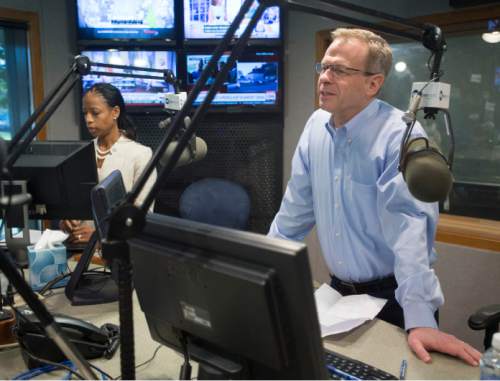This is an archived article that was published on sltrib.com in 2015, and information in the article may be outdated. It is provided only for personal research purposes and may not be reprinted.
Democrats have "no business" winning in Utah's 4th Congressional District, but Doug Owens gives them a realistic chance to unseat Rep. Mia Love, according to the Cook Political Report, a widely followed handicapper of congressional contests.
David Wasserman, Cook's House editor, shifted the race from "likely Republican" to "lean Republican" on Friday, criticizing Love's performance beginning with her first race in 2012, which she narrowly lost. At the same time, Wasserman praised Owens as a moderate who has cultivated donors.
"It has been four years now, but for whatever reason, Mia Love just hasn't taken in the district, she hasn't bonded with [it] yet," he told The Salt Lake Tribune. "It comes down to the moderate business nature of the district that is skeptical of tea-party types and her penchant for the spotlight that has rubbed voters the wrong way."
Dave Hansen, Love's campaign strategist, responded to the rating shift by saying: "We will politely disagree with them. We think she is in good shape."
Wasserman called Owens "as good a candidate as Democrats can hope for," in the mold of former Rep. Jim Matheson, the moderate Democrat who held the seat for seven terms before he retired in 2014.
Love beat Owens by 5 percentage points that year, making her one of 16 House Republicans to win by less than 10 percentage points.
The only reason Wasserman doesn't consider the race a pure "toss up" is the strong conservative tilt of the 4th District.
The Democrat representing the most Republican district in the nation is Rep. Collin Peterson, from Minnesota, though his district is 6 percentage points more Republican than the national average.
Utah's 4th District is 16 percentage points more Republican than the average.
"This would be the political equivalent of lightning striking," Wasserman said. "It would really take a perfect storm to elect Doug Owens in a seat as Republican as this, and yet you have this combination of a fairly weak incumbent and a fairly strong challenger who can raise money."
In reaction, Owens issued a statement that said: "The widespread excitement and interest in the race is great, but I'm not taking anything for granted. I'm working hard each day for every vote."
That's similar to what Hansen said about the incumbent.
"We take nothing for granted, and she'll work as hard as she possibly can to make sure she is re-elected," he said. "But most of all, she'll continue to represent the people in the district."
Cook Political Report kept the first Love-Owens showdown in its "likely Republican" category throughout the 2014 contest, and Wasserman was blunt: "We didn't think we had a race last year."
He says that's changed because Love hasn't been able to capitalize on her incumbency. She's seen no spike in the few public opinion polls that have been released — such as the Utah Policy poll that had Love at 49 percent to Owens' 38 percent — in late September. And Love has been criticized for using taxpayer money to pay for her flight to the White House Correspondents Dinner, the glitziest party in D.C. She has repaid that money.
Also, Owens has the support of the Democratic Congressional Campaign Committee and raised $322,700 in the first fundraising period.
Wasserman predicted a more confrontational rematch in 2016, after Love generally restrained herself from criticizing Owens in the last election.
"Love is going to have to portray him as a pawn of the D.C. Democrats. Owens has lived in D.C. and he has been raising money with the help of more liberal Democrats," he said.
Owens spent last week in D.C. and met with Wasserman at the invitation of the Cook Political Report. It's not uncommon for challengers to meet with political handicappers. Love met with the Cook Political Report and other similar organizations when she ran against Matheson in 2012.
Cook expects Democrats to pick up five to 10 House seats in 2016, which would leave the Republicans in the majority. Republicans hold 247 seats to the Democrats' 188.
Twitter: @mattcanham



